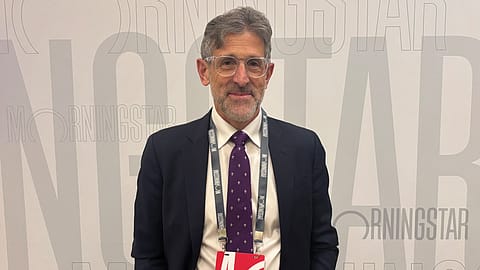Tariffs will have nuanced effects on inflation, growth, and company performance, says Morningstar's CIO Mike Coop
Bonds have always been a great diversifier – they rarely fall when equities do

Global markets are undergoing fundamental changes that require a new way of thinking, Mike Coop, Chief Investment Officer of Morningstar, told investors at the Morningstar Investment Conference held in Mumbai on November 4, 2025.
“We are at a pretty critical point in time for investors where you need to make that distinction between the things that are worth overlooking because there’s a lot of noise in the body,” he said.
Coop further explained that his keynote was about trying to work out the difference between things that have really changed, and things that are just a cycle. He said that the focus on AI reflected how investors are thinking about structural transformation rather than short-term noise.
Delving into one of the biggest shifts, Coop spoke about global trade and the changing structure of the world economy. “The chart that we are showing here is the average US import tariff rate back all the way to 1893, and what you can clearly see is that toward the end of the period, the rate is moving up,” he said.
According to Coop, the post-war system that promoted globalisation is giving way to a more fragmented one. “The whole game has changed – we are now a bit more like the 19th century,” he said. “We think tariffs are going to have an impact on inflation and growth, but those effects won’t be major. They will be connected to individual companies in a very nuanced way.”
He reminded investors that, after the Second World War, the global order was designed around cooperation. “A new era was put in place – a world of fair trading supported by multilateral bodies and clear laws,” he said. “But that era has changed.” Coop noted that the US, once the architect of this system, is now prioritising its own domestic goals. “Trade is being used as a way to stimulate the economy and as a negotiating tactic to bring investment into the US,” he explained. “What matters more to the US now is trying to reduce physical deficits and secure its own strategic interests.”
Expanding his view to defence and geopolitics, Coop said, “We are moving away from a rules-based order to a deal-based one. It’s unpredictable and it’s very specific to the situation and the leader of the time.” He drew parallels with the 19th century, when global powers relied on informal arrangements and shifting alliances rather than stable institutions. “We’re starting to get a wider range of potential scenarios than we’re used to, as we move into this more random, deal-based way of operating,” Coop observed.
Recommended Stories
Despite the challenges, he said investors could still navigate the uncertainty through discipline and diversification. “We think investors can rely upon five fundamentals in environments of heightened uncertainty,” he said. “The first of those is diversification.” Coop reminded the audience that bonds remain an important stabiliser, “Bonds have always been a great diversifier. We found that when equities are down, bonds are down only seven percent of the time.”
He also pointed to opportunities in emerging markets. “We see opportunities in emerging Asia, healthcare, and high-quality bonds,” he said, stressing that investors should “think probabilistically rather than anchoring their strategy to one scenario.”
However, Coop cautioned against complacency. “You should be close to monitoring markets,” he said. “The bar is high in terms of really changing your asset allocation, because uncertainty makes it hard to make big calls.” He ended on an encouraging note, “Diversification at this point in time is pretty important, both at a geographic market, an industry, and a stock level – and valuation is even more important because everything gets correlated when everything is over-favoured at the same time.”